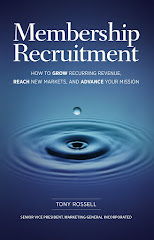
This month I was fortunate to be appointed to the ASAE International Section Council. I met some very interesting and dedicated council members.
But I left the meeting with a question. How uniquely North American is the concept of affiliation and membership in associations? Is membership marketing different here in the U.S. compared to other nations and cultures.
As you may remember, Alexis de Tocqueville wrote on this topic. He said,
“Americans of all ages, all conditions, and all dispositions constantly form associations. They have not only commercial and manufacturing companies, in which all take part, but associations of a thousand other kinds, religious, moral, serious, futile, general or restricted, enormous or diminutive. The Americans make associations to give entertainments, to found seminaries, to build inns, to construct churches, to diffuse books, to send missionaries to the antipodes; in this manner they found hospitals, prisons, and schools. If it is proposed to inculcate some truth or to foster some feeling by the encouragement of a great example, they form a society. Wherever at the head of some new undertaking you see the government in France, or a man of rank in England, in the United States you will be sure to find an association.
I met with several kinds of associations in America of which I confess I had no previous notion; and I have often admired the extreme skill with which the inhabitants of the United States succeed in proposing a common object for the exertions of a great many men and in inducing them voluntarily to pursue it.
I have since traveled over England, from which the Americans have taken some of their laws and many of their customs; and it seemed to me that the principle of association was by no means so constantly or adroitly used in that country. The English often perform great things singly, whereas the Americans form associations for the smallest undertakings. It is evident that the former people consider association as a powerful means of action, but the latter seem to regard it as the only means they have of acting.[1]”
However, ASAE’s The Decision to Join shows many common perspectives from the 2,439 survey participants who reside outside the United States. For example, “Asked about their overall attitude toward associations, the difference between these two segments [U.S. and Non-U.S} is negligible.[2]”
But DTJ did note that there are some demographic differences between U.S. and non U.S. respondents.
“By a very substantial margin, global respondents are affiliated with academic institutions . . .
Respondents outside the United States are disproportionately male, and this is the most substantial gender difference seen in any of the segment comparisons . . .
Global members are less apt to be promoters of their association than their domestic colleagues.[3]”
By the way, click here to get your own copy of The Decision to Join.
What are your thoughts on the global perspective of membership and affiliation with associations? Please share your comments.
By the way, click here to get your own copy of The Decision to Join.
What are your thoughts on the global perspective of membership and affiliation with associations? Please share your comments.
[1]Alexis de Tocqueville, Democracy in America, Chapter V, OF THE USE WHICH THE AMERICANS MAKE OF PUBLIC ASSOCIATIONS IN CIVIL LIFE.
[2] James Dalton and Monica Dignam, The Decision to Join: How individuals determine value and why they choose to belong, ASAE and The Center for Association Leadership, p.61.
[3] DTJ, p. 71







No comments:
Post a Comment